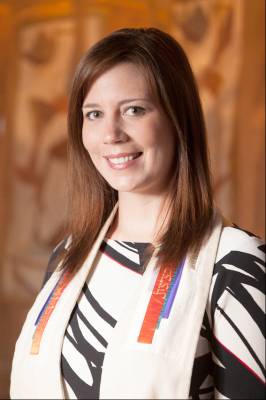
Jews are good at nostalgia. We remember with fondness the tenements of the Lower East Side when our community was tight knit and intact. We remember the quaintness of shtetl life untouched by outsiders. We yearn for the sovereignty of Ancient Israel where we controlled our own fate, unmolested by other nations.
But as Rabbi Rachel Adler reminds us, “there never was a time when ancient Israelite religion or the Judaism that succeeded it were not being influenced by the cultures and religions they encountered.”1
To be Jewish is to mix with others. In our early days, we called ourselves Hebrews, iv’rim — boundary crossers. For most of the last two thousand years, we have wandered throughout the world, adopting elements of our host cultures as our own. Today, we engage the question of a more complete assimilation with the dominant culture around us. At every stage, we have been defined by how we engage with others. And it makes us nervous.
We may yearn for a time when we were free of outside influences. But “a nostalgia for such a time is a nostalgia for what never was.”2
Enough with the nostalgia for a simpler era.
We should stop seeing these encounters with “the Other” as problems and start seeing them as opportunities. What if the story we told ourselves about the Other was one in which our encounters made us stronger?
We have substantial precedent for that narrative with Moses in this week’s Torah portion, Parashat Yitro. Moses struggles to the lead the Jewish people. He finds himself exhausted listening to a litany of cases as the only judge for the entire Israelite community. He cannot dig himself and his people out of this rut, and he doesn’t even know how to start trying. It is an encounter with his Midianite father-in-law, Yitro that enables his breakthrough. He embraces the recommendation of this Midianite priest in how to structure the Israelite community.
Yitro tells Moses, “Make it easier for yourself by letting them [additional leaders] share the burden with you. If you do this — and God so commands you,” you and the people won’t be so tired. “Moses heeded his father-in-law and did just as he said” (Exodus 18:22-24).
A pagan priest saved our community from implosion and gave us a blueprint for how to function.
In that moment, Moses could have rejected his father-in-law’s advice. After all, what does an outsider know about our community that gives him the credibility to weigh in?
Moses teaches us that our encounter with “the Other” can be an asset for our evolution, not an obstacle to our survival. That interfaith encounter made Moses a better Israelite leader. Sometimes, we need insight from the outside to demonstrate what else is possible for us.
I had my own transformative “Yitro” encounter a few years ago. In December 2015, I attended Bible study at Emanuel AME Church in Charleston, South Carolina, six months after a white supremacist opened fire and killed nine members of their community. I was shocked to witness a church united in forgiveness. They drew strength from the fact that Jesus forgave his tormentors. They applied his model in their own lives to forgive a murderer. They refused to allow hatred into their hearts.
I envied that spiritual disposition to forgiveness. It made me recognize the utter pettiness of grudges I held in my own life.
That Christian community facilitated a spiritual breakthrough I was not going to reach on my own. It made me take more seriously the language of forgiveness that already exists within Judaism. I dug into Jewish texts. I studied. I did my best to implement changes in my life. That encounter with Christians made me a better Jew.
In my interfaith work, I have witnessed so many Yitro encounters. I have witnessed Jews yearning for the deeply personal relationship with God that many Muslims speak of so naturally. I have witnessed Muslims hungry for the culture of argument lived out in the Jewish sacred texts. The phenomenon is a kind of “holy envy.” It is the idea that our own lives and tradition can be enriched by learning from the faith, spirituality, and action of “the Other.”
We have grown accustomed to telling ourselves a bad story about our history with the Other. The Other has tried to defeat us, expel us, extort us, and kill us. There is truth to that narrative historically, but it’s only half of the truth. And I think that we would benefit from drawing out the untold good that has come — and can come — from encounters with the Other.
Moses’ relationship with Yitro reminds us that transformation by the Other is not peripheral to our tradition. It is the very core foundation upon which our community was built. For too long, we have told ourselves that the Other should be a source of fear. That fear blinded us from the possibility that we actually need the Other to become better Jews.
1 Rachel Adler, “‘To Live Outside the Law, You Must Be Honest’ — Boundaries, Borderlands and the Ethics of Cultural Negotiation” The Reconstructionist, Spring 2004
2 Ibid.
 The Rabbis knew what they were doing when they divided the Five Books of Moses into portions. It was no accident that they joined the giving of Torah with the story of Yitro. They could have started the parashah with chapter 19 calling it Bachodesh, which is the first word of that chapter. Instead, their choice to begin with chapter 18 means that when we speak of Sinai, we often do so quoting from Parashat Yitro. Our source of Revelation is forever linked to the name of a Midianite priest. As Rabbi Bassin teaches, our interconnected relationship with the Other is core to our essential way of being in the world.
The Rabbis knew what they were doing when they divided the Five Books of Moses into portions. It was no accident that they joined the giving of Torah with the story of Yitro. They could have started the parashah with chapter 19 calling it Bachodesh, which is the first word of that chapter. Instead, their choice to begin with chapter 18 means that when we speak of Sinai, we often do so quoting from Parashat Yitro. Our source of Revelation is forever linked to the name of a Midianite priest. As Rabbi Bassin teaches, our interconnected relationship with the Other is core to our essential way of being in the world.
How could it be otherwise?
It would be shortsighted to say we have nothing to learn from outside our community. Moses realized this. He likely didn’t even question it. In his environment, he was immersed in many worlds even as he championed the rights of one.
What did he learn? Yitro taught him how to manage his business of justice better. Yitro was masterful in making sure Moses could “hear” his advice. He offered greeting (Exodus 18:6-7), gratitude (Exodus 18:10), and graciousness (Exodus 18:12) before offering a clear critique, “The thing you are doing is not right” (Exodus 18:17).
While Moses learned from Yitro about management, Yitro “rejoiced over all the kindness that the Eternal had shown Israel when delivering them from the Egyptians” (Exodus 18: 9). Moses shared his own story of God’s goodness, opening Yitro’s heart to the teachings of the Eternal. In this way, the learning went both ways.
Could we say their encounter was even revelatory? Jewish French philosopher Emmanuel Levinas explains: “[T]he Other faces me and puts me in question and obliges me.”1 “[T]he face is what forbids us to kill.” 2 Yitro and Moses model in the human dimension what will be revealed in the divine dimension two chapters later. The Rabbis reinforce this reading by naming it Parashat Yitro.
1. Emmanuel Levinas, Totality and Infinity: An Essay on Exteriority (Pittsburgh: Duquesne University Press, 1969), p. 207
2. Emmanuel Levinas, Ethics and Infinity: Conversations with Philippe Nemo, (Pittsburgh: Duquesne University Press,, 1995, p. 86
Yitro, Exodus 18:1-20:23
The Torah: A Modern Commentary, pp. 508-565; Revised Edition, pp. 468-506
The Torah: A Women’s Commentary, pp. 407-426
Haftarah, Isaiah 6:1-7:6; 9:5-6
The Torah: A Modern Commentary, pp. 710-713; Revised Edition, pp. 507-509


